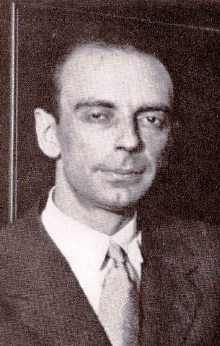Joan Lluhí facts for kids
Quick facts for kids
Joan Lluhí i Vallescà
|
|
|---|---|
 |
|
| Minister of Labor, Health and Social Assurance | |
| In office 13 May 1936 – 19 July 1936 |
|
| Preceded by | Enrique Ramos y Ramos |
| Succeeded by | Bernardo Giner de los Ríos García |
| Minister of Communications and Merchant Navy | |
| In office 19 July 1936 – 19 July 1936 |
|
| Preceded by | Bernardo Giner de los Ríos García |
| Succeeded by | Bernardo Giner de los Ríos García |
| Minister of Labor, Health and Social Assurance | |
| In office 19 July 1936 – 4 September 1936 |
|
| Preceded by | Bernardo Giner de los Ríos García |
| Succeeded by | José Tomás y Piera |
| Personal details | |
| Born | 12 October 1897 Barcelona, Spain |
| Died | 21 August 1944 (aged 46) Mexico |
| Occupation | Lawyer, politician |
Joan Lluhí i Vallescà (born October 12, 1897 – died August 21, 1944) was a Spanish lawyer and politician. He was part of a political group called the Republican Left in Catalonia. He also served as a minister in the government of the Second Spanish Republic, looking after areas like work, health, and social care.
Contents
Early Life and Education
Joan Lluhí i Vallescà was born in Barcelona, Spain, on October 12, 1897. His father, Joaquim Lluhí i Rissech, was also a lawyer. His father helped start some important political groups.
Joan went to high school in Barcelona from 1910 to 1915. After that, he studied law at the University of Barcelona. He became a lawyer and was also a Freemason. In 1929, he started and edited a newspaper called L'Opinió.
Political Career in the Second Spanish Republic
Joan Lluhí was one of the people who helped create Esquerra Republicana de Catalunya (Republican Left of Catalonia). This was a major political party.
Joining the National and Catalan Parliaments
In 1931, he was elected to the national parliament for Barcelona. He also became a member of the Catalan parliament. He helped write the 1932 Statute of Núria. This document was very important for giving Catalonia more self-rule.
Roles in the Catalan Government
From October 1932, he was in charge of Public Works in the Catalan government. This government was called the Generalitat of Catalonia. In December 1932, he also became the President of the Executive Council of the Generalitat. He left this role in January 1933. This was because he disagreed with President Francesc Macià about how powers should be shared.
Forming a New Political Group
Lluhí was not part of the government that started in January 1933. In October 1933, he left Esquerra Republicana. He then started a new group called the Partit Nacionalista Republicà d’Esquerra. This group included people who used to follow his newspaper, L'Opinió. Later, he led this group back into the Esquerra party.
Return to Government and Challenges
In January 1934, he was appointed Director of Justice in the government of Lluís Companys. However, he was suspended from his role later that year. This happened after an attempted revolution following the Asturian miners' strike of 1934. He faced consequences for his involvement in the events of October 1934. He was removed from his political role and spent some time in prison.
Re-election and National Minister Role
In February 1936, Lluhí was elected to the national parliament again. He was officially pardoned a few days later. In March 1936, he was again appointed Director of Justice and Law in the Generalitat. He left this job when he became a national minister.
On May 13, 1936, Lluhí became the Minister of Labor, Health and Social Assurance. This was in the government led by Santiago Casares Quiroga. His appointment was meant to help calm tensions across Spain. However, some people felt he was not ready for such a big job. He did not seem to fully understand the growing danger of civil war in July 1936.
Civil War and Life in Exile
When the Spanish Civil War began on July 19, 1936, Lluhí had a very short role. He was the Minister of Communications and Merchant Marine for just a few hours. This was in the government of Diego Martínez Barrio.
Later, in the government of José Giral, he was again Minister of Labor, Health and Social Assurance. He held this position from July to September 1936. After this, Lluhí served as a consul for the Republic in Toulouse, France. He stayed there until the end of the Spanish Civil War in 1939. He was involved in watching agents from the opposing side in France.
After the Republicans lost the war, Joan Lluhí went into exile. This means he had to leave his home country. He always had poor health. Joan Lluhí died in Mexico on August 21, 1944, when he was 46 years old.
Sources
See also
 In Spanish: Juan Lluhí para niños
In Spanish: Juan Lluhí para niños
 | Jackie Robinson |
 | Jack Johnson |
 | Althea Gibson |
 | Arthur Ashe |
 | Muhammad Ali |

